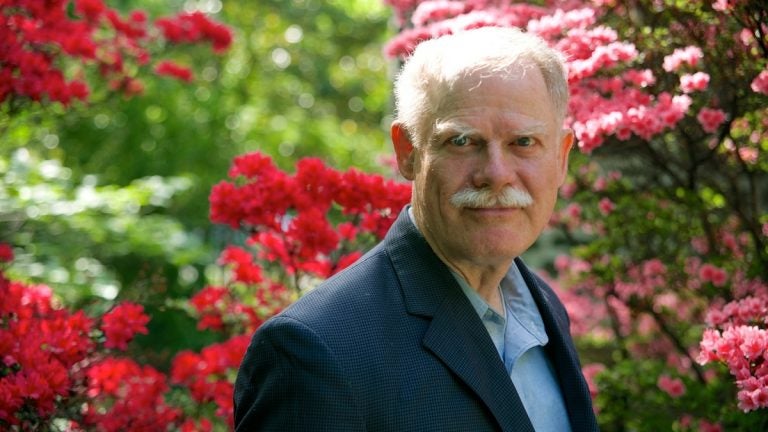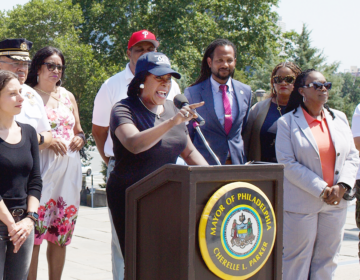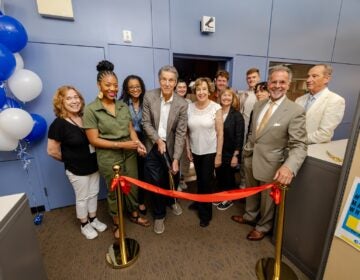9 questions for Paul Glover, Green Party gubernatorial candidate from Germantown

Germantown resident Paul Glover received the Green Party's nomination for governor in March. (Bas Slabbers/for NewsWorks)
You probably haven’t heard the name Paul Glover mentioned alongside Tom Corbett, Tom Wolf, Allyson Schwartz, Rob McCord and Katie McGinty in coverage of Pennsylvania’s gubernatorial race.
But, the self-described “social entrepreneur” from Germantown (since 2005) would like you to know that he has, in fact, thrown his name into the ring with those vying to lead the commonwealth from Harrisburg.
Sure, it’s a longshot that the 66-year-old could become the second governor from Northwest Philadelphia in the young 21st century (East Falls’ Ed Rendell, of course, was the first; Schwartz used to live in Mt. Airy), but long odds didn’t stop the restless organizational-founder/author/teacher from crafting a platform.
What he’s about
What he’s against: Fracking, capital punishment and prisons.
What he’s for: Progressive taxing, green-jobs generation, expanded rail and transit and restoring “faith in the Commonwealth of Pennsylvania.” In a recent NewsWorks story, Glover stated that he’d also like to see vehicles banned from Center City.
(More information about the candidate and his platform can be found on his campaign website or Facebook page.)
Party history
Jay Sweeney, chair of the Green Party of Pennsylvania, explained that Glover (who is running on a ticket with lieutenant-governor candidate Wendy Lynne Lee) is a bit of a historical outlier.
He would be the first Green Party gubernatorial candidate on the ballot since Michael Morrill, who received one percent of the vote in 2002. Four years later, Sweeney said, nominee Marakay Rogers “withdrew when her petitions were challenged and threatened with court costs.”
“That, and Mel Packer‘s challenge in 2010 when he ran for Senate, have resulted in an unwillingness in many to come forward and run for office,” he said.
But Glover is willing to come forward.
Having received the party’s nomination in March, he spoke with NewsWorks this week about his uphill political battle.
The interview
NewsWorks: Have you ever run for office before?
Paul Glover: “The Green Party of America wrote me a letter in 2003 asking if I’d consider running in Presidential primaries, and I agreed to do that.
“It wasn’t much more than putting a website up proposing solutions, and that is the primary theme for this candidacy, as well.
“There is a whole lot of griping on the left, on the right and in the befuddled center. Solutions that will bring us together are harder to hear above the din.
“I was on the ballot, after making no effort, in five states. I received delegates at national convention. How many? I don’t even know, but the delegates asked for instructions and I said after the first round, cast my votes for Ralph Nader.”
NW: Where does your getting-on-the-ballot effort stand?
PG: “Our primary [effort] is signature gathering. The Green Party needs 17,000 to get on the ballot while Republicans and Democrats only need 2,000.
“The game is rigged in several ways. No candidate-forum invitations. I need more than eight times as many signatures to get on ballot. Press releases I’ve sent out more than 400 media statewide have been discarded, ignored.
“Even the petitions that we are required to circulate are on legal-sized paper, not the kind that’s easy for people to print at home.
“In every manner large and small, new voices are kept from the discussion.
“I’ve gathered around 400 signatures so far, and people around the state are gathering them, too. If 200 people get one signature a day until the end of July, we’ll have our signatures. I’ve been going to events, Rittenhouse Square, farmers markets, any festival; 95 percent of the people I’ve spoken to are enthusiastic and ready to sign happily.
“People fed up with the corporate domination of the discussion. The Green Party offers solutions that expand possibilities rather than contract them.”
NW: What would you winning mean for Germantown and Northwest Philly?
PG: “It would probably mean that I would move away from Germantown since I’d be required to set up shop in Harrisburg. So, someone else would be able to rent my apartment.
“Of course, because I have roots and affections in Philadelphia, and terrific insight into Philadelphia and its problems, I’d enthusiastically set out to find solutions to all its social, economic and environmental problems.”
NW: Say I randomly met you out on Germantown Avenue and you have one minute to convince me to vote for you over the established major-party candidates, what’s your pitch?
PG: “When conservatives don’t conserve, and liberals don’t liberate, greens become centrists looking to solve problems with our schools, create jobs, improve healthcare, clean air and water, secure homes.
“I’m the only candidate who would ban fracking, cancel prison construction and shift that money to schools, and create a half million green-collar jobs statewide without raising taxes, but with progressive taxation.
“I’m also the only candidate who would legalize marijuana and free its prisoners and expunge their records.”
NW: “Hippie” was the first word that came to mind when perusing your site. Is that fair?
PG: “I think that the values of peace, justice and nonviolence and duty are more relevant and urgently needed today than even during the 1960s.
“The only thing I recommend putting into your lungs is clean air. I don’t toke. But, to criminalize a weed which pleases people while tobacco kills 440,000 each year legally is itself a crime.”
NW: Some would say starting 18 different groups [as listed on his resume’s CV] is emblematic of a divided attention span. Is it?
PG: “Most of these are sequential. I’m not spinning plates to keep these going. When I can set table and watch the community bring the feast, that’s my greatest satisfaction.
“For me, it’s all about starting an organization and turning it over to capable people. I do this because I see solutions to all bad headlines and then proceed with values of economic and social justice to define simple plans that bring people together to combine their skills and fix what’s broken.”
NW: How did you earn money as a chess player, as mentioned as a former source of income on your site?
PG: “That was among a long list of ways I’ve earned money, not a significant source. I used to play tournaments years ago.
“As recently as three years ago, Weaver’s Way had a plan where if you beat a Chestnut Hill chessmaster, you’d get a $10 gift certificate. I beat him three times.”
NW: Where do your fundraising and ballot-signature efforts stand?
PG: “I’m relying on social media so far. The standard media has refused to acknowledge the campaign’s existence.
“So, distribution of platform ideas, attracting volunteers and signature gathering and fundraising, the media prevents the public from hearing about alternatives and keeps them confined in the corporate cage.”
NW: Can you win?
PG: “That remains to be seen. This conversation gives me an opportunity to be heard, though.
“More than 40 percent of Pennsylvanians are registered as independent. In a recent Gallup poll, 60 percent of people [nationally] want a third party.
“I’m looking at it like this: Having seen the four [Democratic] candidates for the last six months, 33 percent remain undecided? To me, that reflects dissatisfaction.
“Voters don’t see enough difference among them, and they’re not hearing what they want to hear.
“Five to 10 percent of voters will not vote for a candidate who won’t end fracking. They will sit home, but because I’m capable, some Democrats tell me that they’ll be writing in my name on May 20. There are 40 anti-francing organziations in the state, too. I’ll actually be going to one of their events tonight [Monday night] to continue gathering signatures.
“As you can see, I’m an intruder. I intrude into issues surrounding food, fuel, housing, planning, finance, to try and do whatever needs to be done better on behalf of people and the environment.”
WHYY is your source for fact-based, in-depth journalism and information. As a nonprofit organization, we rely on financial support from readers like you. Please give today.




